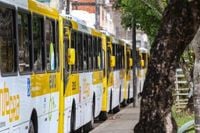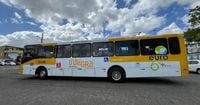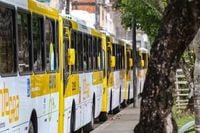The circulation of urban buses in Salvador resumed around 8:00 AM on Wednesday, April 30, 2025, after a four-hour delay caused by a mobilization of road workers. The service had been suspended from the early hours of the morning due to a protest that shut down two garages—G2 Plataforma and G3 OT Trans—where the workers held an assembly.
This stoppage aimed to pressure transport business owners, who, according to the workers, failed to present concrete proposals during four rounds of negotiations in the wage campaign. As the buses began to roll out, the public transport operation is expected to normalize gradually throughout the day.
The main demands from the road workers include a salary adjustment, an increase in the food ticket value, and the provision of psychological support. The Secretary of Mobility (Semob) expressed hope for an understanding between business owners and road workers to prevent disruption of this essential service for the city’s daily routine.
Salvador was set to face delays in bus circulation early on Wednesday as the Bahia Road Workers Union announced the stoppage, primarily affecting the garages of the Plataforma and OT-Trans companies. This mobilization was part of the workers' Salary Campaign and served as a protest against the lack of new proposals from the companies.
The decision for the protest was made during a meeting held in the early hours of the same day, where the union defined the affected garages and the expected duration of the stoppage. In a statement, the union noted that "in addition to the lack of dialogue, the employers are attempting to strip historical rights from the category, rights that were won through years of struggle." They further emphasized that "the road workers will not accept setbacks, nor the exclusion of essential items from the list of demands."
According to councilman Hélio Ferreira (PCdoB), who represents the road workers, the delay resulted in over 400 buses not circulating during the morning hours, impacting neighborhoods such as Sussuarana, Tancredo Neves, Castelo Branco, Águas Claras, Pirajá, and the Pirajá Station region. He urged the public to understand the situation, stating, "We ask for the population's understanding."
The Municipal Secretary of Mobility reported that 69 bus lines were directly affected by the stoppage at the G2 and G3 garages. In response to the situation, Semob prepared a contingency plan to mitigate the impact on commuters, involving the reassignment of fleets from other operational units to serve the affected lines.
During the protest, Semob inspection teams, alongside representatives from the bus companies, were stationed at key points throughout the city to guide users on operational adjustments. As soon as the assembly concluded and the buses were released from the garages, the system was expected to return to normal operations gradually.
Following the protest, the Bahia Road Workers Union authorized the departure of buses from the two garages around 8:00 AM, about four hours later than usual. This decision stemmed from a demonstration against Integra, the company responsible for the public transport system in the capital. As negotiations continued to stall, the workers had not yet reached an agreement with the business owners, with the last round of discussions occurring on April 29, 2025.
The road workers are demanding a salary adjustment that includes a 5% real gain above inflation and a 15% increase in the food ticket value, among other requests. Integra Plataforma, in a statement to the media, claimed that they participated in the fourth round of negotiations but criticized the union for refusing to debate and not presenting a new proposal beyond the original agenda.
The company described the delay in bus departures as an "illegal and abusive posture," asserting that the union was asked to clarify their demands objectively and what had already been offered. Integra noted that the agenda contains over 100 items, which complicates any potential progress unless there is a willingness to negotiate responsibly.
According to the company, the current set of demands represents an estimated 50% increase in personnel costs, which they deemed unfeasible in the current economic climate. They emphasized that without a prioritization of key issues, they would continue to regard all demands collectively, hindering the possibility of an agreement.
As the day progressed, the situation remained fluid, with both sides hoping for a resolution that would restore normalcy to the public transport system in Salvador. Commuters and residents alike are eager for a swift resolution to avoid further disruptions to their daily lives.






